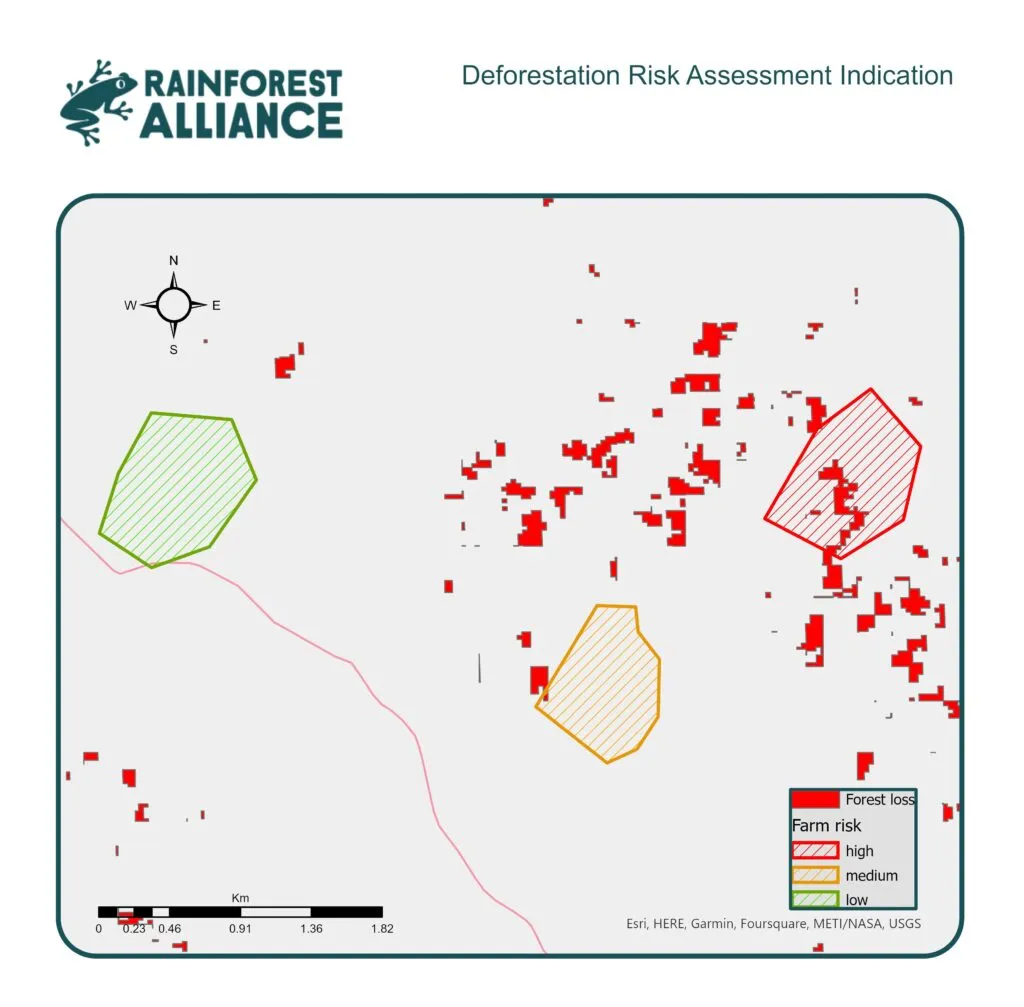Nearly half of the Earth’s original forest cover has already been lost, and each year an additional 12 million hectares (29.5 million acres) are destroyed according to a report from Global Forest Watch. Not only is this tragic for the local communities and ecosystems deforestation affects, but also for the larger impact it has on climate change, as forests store more than half of the global carbon stock.
Companies have a significant role to play in combatting deforestation within their supply chains. Agricultural expansion is one of the biggest drivers of forest loss, yet 40 percent of the world’s largest contributors lack a single deforestation sourcing policy—and with those with sourcing policies falling short of their commitments, it’s clear that something is missing. For many companies, difficulty navigating regulation—including the recent European Union Deforestation Regulation (EUDR)—and lack of data needed to both understand their sourcing risks and compliance needs is holding them back from setting and pursuing ambitious deforestation-free activities.
The Rainforest Alliance has developed a comprehensive approach to helping your company achieve deforestation-free supply chains and protect the world’s forests.
Rainforest Alliance Certification: a 360-degree approach for deforestation-free supply chains

The Rainforest Alliance Certification Program uses farm and landscape-level strategies to safeguard our remaining forests and other natural ecosystems and increase native biodiversity and vegetation on farms—all while supporting the livelihoods of farmers and forest communities who rely on these ecosystems.
The Rainforest Alliance Sustainable Agriculture Standard does not allow the certification of farms on which destruction or conversion of natural ecosystems occurred later than January 1, 2014. This cutoff date is aligned with international regulations, such as the EUDR and frameworks such as the Accountability Framework initiative. In addition, we protect the rights of Indigenous peoples and local communities with core requirements on land governance that prohibit farming anywhere with outstanding land claims or conflicts.
But what really makes our program unique is our data-driven approach to risk analysis. Using a mix of public and private data, we have developed customized maps that allow us to more accurately pinpoint areas at risk for deforestation in a specific sector or country. This allows us to identify risks beyond certified crops, enables auditors to focus their activities.
Closing the data gaps: how we spot deforestation with our innovative risk maps
The Rainforest Alliance Certification Program requires all certified farms to be GPS mapped with satellite imaging. Our data collection is based on GPS points and polygons and allows companies to monitor deforestation at scale.
The Rainforest Alliance Certification Program can support companies in carrying out their due diligence related to environmental risks in their supply chain.
Our innovative automated risk assessment maps for deforestation have increased our ability to support efforts to stop deforestation, as they provide more accurate data on farms, and support mapping of the risk beyond certified crops.
When farm groups apply for our certification program, they must submit the GPS locations of farms. In preparation for audits, the Rainforest Alliance and auditors check the GPS locations for any evidence of forest conversion since 2014.
How does this work?
Auditors first triangulate GPS locations provided by the farm or group for accuracy. They then cross-reference the “forest baseline” maps that match our cutoff date of 2014 with customized satellite-based risk maps that show the current situation on the ground. In the past, auditors had little information about where farm plots ended and forests started, as forest conversion to tree crops such as coffee and cocoa can be difficult to detect in tropical landscapes. Our customized risk maps synthesize a mix of publicly available data—often provided by governments, research institutes, and universities—to give a picture of the forest layer at any given moment.
This methodology has higher accuracy than other similar efforts and this, in turn, helps increase the quality of detection between natural forest and agricultural land use in key production regions. Auditors compare these maps to field observations, and if cases of conversion after the cutoff date are found, the farm or group is not eligible for certification.
Since 2021, the Rainforest Alliance has assessed close to four million farms and shared the information with certificate holders to better target our audits. The data that we collect is validated by an internal team, and the risk assessment itself is designed to be easily integrated with other tech systems.
Ensuring deforestation-free supply chains beyond certification
Certification is just one of our tools embedded within a holistic approach to create deforestation-free supply chains. Beyond certification, we support this mission through our Corporate Advisory Services and landscape programs that leverage our public-private partnerships and work with companies to successfully implement no-conversion commitments.
Here’s a closer look at the other ways we help companies achieve deforestation-free supply chains:
- Strategy and advisory services: Together, we can build a responsible sourcing policy that is in line with your goals and leading industry standards, such as the Accountability Framework. We also offer trainings for suppliers and producers to ensure that their activities are in line with your mission and assess your company’s implementation systems so that you have everything in place to achieve deforestation-free supply chains.
- Monitoring and evaluations: Through data collection, verification, and analysis, our team can pinpoint areas of vulnerability within your supply chain as well as recommend corrective actions to mitigate these risks.
- Field-based programs: For example, in 2021, Nestlé and the Rainforest Alliance developed and launched a community-based approach for landscape restoration and forest management in the Beki–Bossematié region of Côte d’Ivoire.
Ready to work toward a deforestation-free supply chain?
Get in touch with us to see what the possibilities are through our certification program, and our other offerings.


